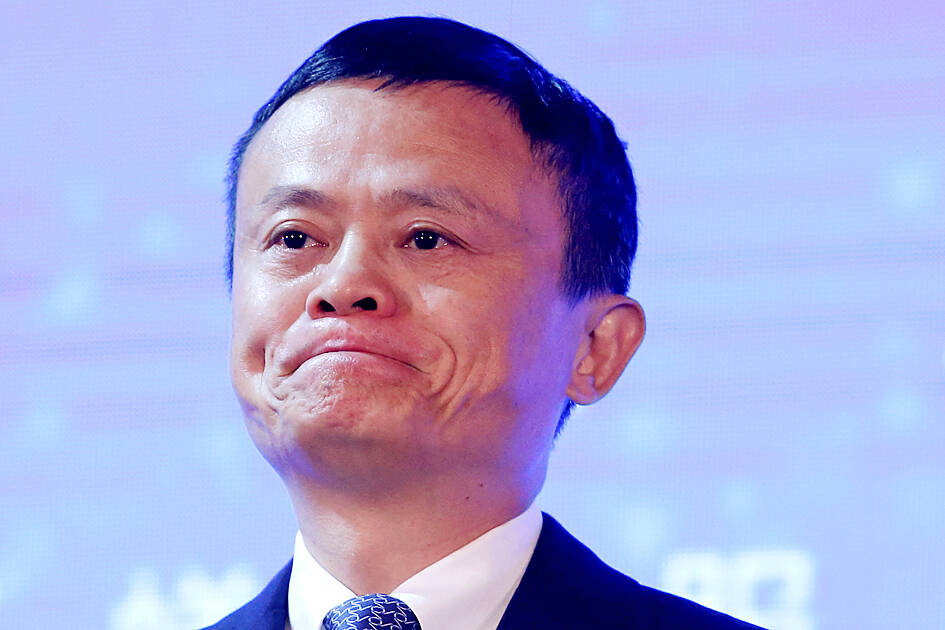Ant Group Co (螞蟻集團) founder Jack Ma (馬雲) is to give up control of the Chinese fintech giant in an overhaul that seeks to draw a line under a regulatory crackdown that was triggered soon after its mammoth stock market debut was scuppered two years ago.
Ant’s US$37 billion initial public offering (IPO), which would have been the world’s largest, was canceled at the last minute in November 2020, leading to a forced restructuring of the financial technology firm and speculation the Chinese billionaire would have to cede control.
While some analysts have said a relinquishing of control could clear the way for the company to revive its IPO, the changes announced by the group yesterday are likely to result in a further delay due to listing regulations.

Photo: Reuters
China’s domestic A-share market requires companies to wait three years after a change in control to list. The wait is two years on Shanghai’s NASDAQ-style STAR market, and one year in Hong Kong.
A former English teacher, Ma previously possessed more than 50 percent of voting rights at Ant, but the changes mean his share would fall to 6.2 percent, Reuters calculation showed.
Ma only owns a 10 percent stake in Ant, an affiliate of e-commerce giant Alibaba Group Holding Ltd (阿里巴巴), but has exercised control over the company through related entities, said the IPO prospectus that Ant filed with the exchanges in 2020.
Ma’s ceding of control comes as Ant is nearing the completion of its two-year regulatory-driven restructuring, with Chinese authorities poised to fine the firm more than US$1 billion, Reuters reported in November last year.
The expected penalty is part of Beijing’s sweeping and unprecedented crackdown on the country’s technology titans over the past two years that has sliced hundreds of billions of dollars off their values and shrunk revenues and profits.
However, Chinese authorities have in the past few months softened their tone on the tech crackdown amid efforts to bolster a US$17 trillion economy that has been badly hurt by the COVID-19 pandemic.
Ant’s market listing in Hong Kong and Shanghai was derailed days after Ma publicly criticized regulators in a speech in October 2020. Since then, his sprawling empire has been under regulatory scrutiny and going through a restructuring.

TRAGEDY STRIKES TAIPEI: The suspect died after falling off a building after he threw smoke grenades into Taipei Main Station and went on a killing spree in Zhongshan A 27-year-old suspect allegedly threw smoke grenades in Taipei Main Station and then proceeded to Zhongshan MRT Station in a random killing spree that resulted in the death of the suspect and two other civilians, and seven injured, including one in critical condition, as of press time last night. The suspect, identified as a man surnamed Chang Wen (張文), allegedly began the attack at Taipei Main Station, the Taipei Fire Department said, adding that it received a report at 5:24pm that smoke grenades had been thrown in the station. One man in his 50s was rushed to hospital after a cardiac arrest

SAFETY FIRST: Double the number of police were deployed at the Taipei Marathon, while other cities released plans to bolster public event safety Authorities across Taiwan have stepped up security measures ahead of Christmas and New Year events, following a knife and smoke bomb attack in Taipei on Friday that left four people dead and 11 injured. In a bid to prevent potential copycat incidents, police deployments have been expanded for large gatherings, transport hubs, and other crowded public spaces, according to official statements from police and city authorities. Taipei Mayor Chiang Wan-an (蔣萬安) said the city has “comprehensively raised security readiness” in crowded areas, increased police deployments with armed officers, and intensified patrols during weekends and nighttime hours. For large-scale events, security checkpoints and explosives

PUBLIC SAFETY: The premier said that security would be tightened in transport hubs, while President Lai commended the public for their bravery The government is to deploy more police, including rapid response units, in crowded public areas to ensure a swift response to any threats, President William Lai (賴清德) said yesterday after a knife attack killed three people and injured 11 in Taipei the previous day. Lai made the remarks following a briefing by the National Police Agency on the progress of the investigation, saying that the attack underscored the importance of cooperation in public security between the central and local governments. The attack unfolded in the early evening on Friday around Taipei Main Station’s M7 exit and later near the Taipei MRT’s Zhongshan

ON ALERT: Taiwan’s partners would issue warnings if China attempted to use Interpol to target Taiwanese, and the global body has mechanisms to prevent it, an official said China has stationed two to four people specializing in Taiwan affairs at its embassies in several democratic countries to monitor and harass Taiwanese, actions that the host nations would not tolerate, National Security Bureau (NSB) Director-General Tsai Ming-yen (蔡明彥) said yesterday. Tsai made the comments at a meeting of the legislature’s Foreign Affairs and National Defense Committee, which asked him and Minister of National Defense Wellington Koo (顧立雄) to report on potential conflicts in the Taiwan Strait and military preparedness. Democratic Progressive Party (DPP) Legislator Michelle Lin (林楚茵) expressed concern that Beijing has posted personnel from China’s Taiwan Affairs Office to its